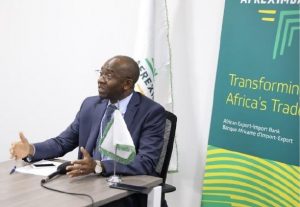…Hinders continent’s economic devt., industrialisation
Africa’s energy poverty, which is a major constraint to the continent’s economic development, now increasingly hinders trade in the continent.
This was disclosed by Hippolyte Fofack, chief economist and director, research and international cooperation at Africa Export-Import Bank (Afreximbank), at the ongoing 27th UN climate summit (COP 27) in Sham El Sheik, Egypt.
Fofack said more than 600 million Africans have no access to energy, resulting in diminished industrialization. Of this figure, 85 million are Nigerians (or 43 percent of the country’s population), making it the country with the largest energy access deficit on the continent.
“These constraints can only be addressed if there is access to energy, and the energy gap is closed,” Fofack said.
He reminded participants that Africa has been in the front line of the climate crisis for decades, posing a major constraint to the continent’s development.

“African governments are spending between 5-11 percent of their GDPs to adapt to climate impacts. With the increasing rate of famine, drought across regions, and rising conflict borne out of the climate crisis as neighbouring communities fight for scarce resources, African development is at risk,” he noted.
He said a just energy transition for Africa means the continent gets its space to develop.
“The transition must be just, fair and equitable. Africa needs the energy to close the gap in terms of income and welfare, between the region and the rest of the world for global convergence,” he said.
Afreximbank, the pan-African multilateral trade bank, is working to ensure African resources are used for developing African economies and African growth, unlike in the past when the bulk of the resources were taken and used to develop the west.
The African Common Position on Energy Access and Just Transition stipulates that Africa will continue to deploy all forms of its abundant energy resources, including renewable and non-renewable energy, to address energy demand. Natural gas, green and low-carbon hydrogen, will play a crucial role in expanding modern energy access in Africa both in the short to medium term, while enhancing the uptake of renewables in the long term for low carbon and climate-resilient trajectory on the continent.
Africa is negotiating for space to exploit its natural gas reserves as base loads. The UN Economic Commission for Africa notes that sub-Saharan Africa’s current emissions will rise by 0.6 percent if the region doubles its electricity production capacity using natural gas only. If North Africa, where most reserves are based, doubles its current production, African emissions would rise by only one percent.
“We believe that the just transition will involve some cleaner form of energy, but Afreximbank will continue to support the development of the continent if it means essentially drilling oil and gas in the oil sector, critical not just for development, but also for macroeconomic stability,” Fofack said.
He cited countries like Nigeria and Angola where 90 percent of government revenue and up to 70 percent of foreign exchange come from the oil and gas sector, stressing that the industry cannot be banned suddenly. The energy mix of renewables and non-renewables will help boost Africa’s industrial base, helping achieve a just energy transition, but he noted the transition to clean energy must not be at the expense of Africa’s economic development.
With the EU-imposed carbon tax for all imports effective 2025/26, goods manufactured within the African Continental Free Trade Area (AfCFTA) might not be permitted into the European market, leaving Africa the largest market for its own products. To address the market challenge, Fofack urged African nations to leverage trade opportunities the AfCFTA presents, as well as boost refining capacity with a potential to reduce the continent’s carbon footprint by more than 50 percent.
Afreximbank is deploying a hybrid financing mode of both clean projects like hydro in Tanzania and solar projects in Cameroun and Sudan, as well as conventional sources of energy.








